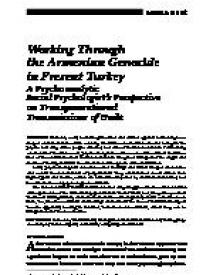Working Through the Armenian Genocide in Present Turkey : A Psychoanalytic Social Psychologist’s Perspective on Transgenerational Transmissions of Guilt
Not only wars, but also genocides and crimes against humanity have shaped and shaken the 20th century. Their traces can still be found today in the psyche not only of the people affected, but also of their descendants. Particularly as a result of the Holocaust, psychoanalysts became aware of the effects that traumas of the victims had on their descendants. They had introjected the anger and shame of their parents in the emotional atmosphere of their families.
Later, psychotherapists also discovered feelings and inner images of violence and war in the descendants of perpetrators. They often talked about diffuse feelings of guilt and shame, which are sometimes repelled by division and denial, but nevertheless cause psychological conflicts.
The descendants of Turkish families do not only struggle with the official denial of the genocide of the Armenian population in World War I, but, they also question their own family history and whether and how their grandparents were involved. Here, too, massive conflicts and feelings of shame in the face of this historical past become apparent, leading to internal, but also social conflicts, unless they can be integrated and thus overcome.
Geachte bezoeker,
De informatie die u nu opvraagt, kan door psychotraumanet niet aan u worden getoond. Dit kan verschillende redenen hebben,
waarvan (bescherming van het) auteursrecht de meeste voorkomende is. Wanneer het mogelijk is om u door te verwijzen naar de bron
van deze informatie, dan ziet u hier onder een link naar die plek.
Als er geen link staat, kunt u contact opnemen met de bibliotheek,
die u verder op weg kan helpen.
Met vriendelijke groet,
Het psychotraumanet-team.
In: Journal of Psychohistory ; ISSN: 0145-3378 | 49 | 2 | 119-138


